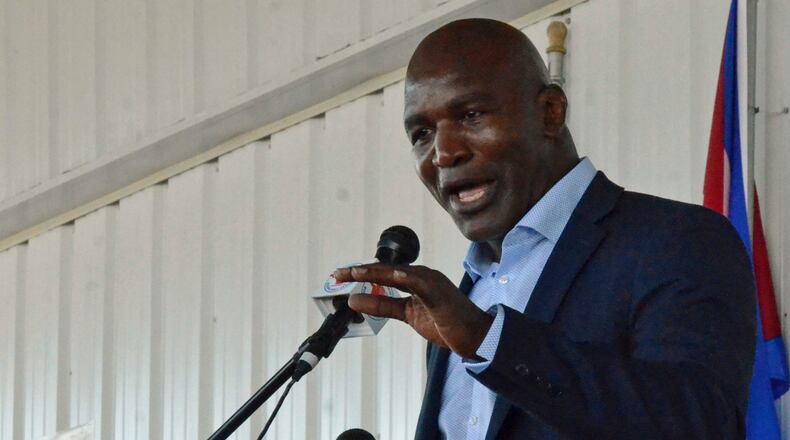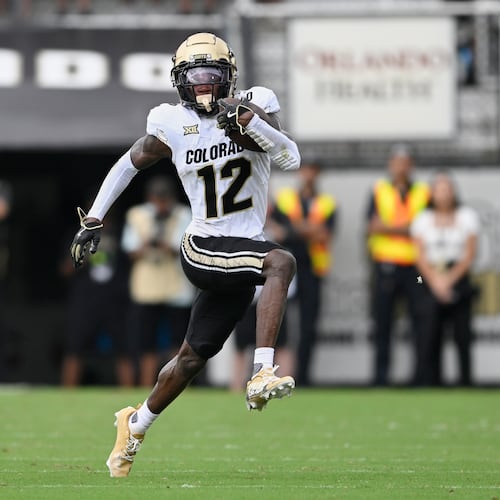CANASTOTA, N.Y. -- There’s a common joke in boxing that no fighter ever lost a fight. If he is knocked out, it's because of a previously undisclosed injury or a stomach virus. If he loses a decision, it's because the judges were bought, or blind, or always had it in for (fill in the blank), or possibly all three.
Evander Holyfield could rest easy Sunday. After a professional career that stretched 27 years, 57 fights and five world championships, he won his final competition by an overwhelming decision. His legacy was cemented as a first-ballot Boxing Hall of Famer, culminating with Sunday's induction ceremonies.
Having faced doubts throughout his career about his legitimacy as a heavyweight, then his ability to win past his prime, it wasn't surprising what Holyfield said offstage when asked what he would remember most about this weekend.
“They were honest about what I did," he said. "I did everything I could to be the best. I didn’t take shortcuts. I didn’t take steroids. I had people telling me that others were doing it but I didn’t want my record blemished. The only thing in my life I really did right all the time was boxing."
Pause for the ever-present momma pearl of wisdom.
"My momma said, ‘You can’t be the best at a lot of things.' But the truth is, I didn’t have many things to choose from.” And he laughed.
Atlanta hasn’t been blessed with many sports champions. It’s strange in some ways that Holyfield isn’t referenced more often as one of the city's rare sports success stories, given he grew up in Atlanta (though he was born in Atmore, Ala.), pumped gas at DeKalb-Peachtree Airport, worked concessions at the old Fulton County stadium, played high school football (not particularly well), went on to make the make the U.S. Olympic boxing team in 1984 and won a silver medal -- an unjust disqualification negated the gold – and then became the only heavyweight in history to win the title four times.
He also beat Mike Tyson, the sport's feared Godzilla, twice.
Holyfield added an unusual sense of normalcy to boxing, a sport too often punctuated by the lowest common denominator. He was the ultimate overachiever, a warrior, and, even with personal flaws, always pleasant, courteous and one of the most humble celebrities one could ever meet.
At a time when he had earned more than $200 million in his career, he sometimes would work out at a public health club in Houston, where he often trained before fights, standing in line for the weight bench. He even flew the budget airline AirTran. When I asked him why, he said, “It’s cheaper and they don't charge me when I want to change my flight.”
He lost most of his fortune, of course. The discipline he had in boxing he too often didn’t apply in his personal or business life. But he’s putting his finances and life back in order. He was surrounded Sunday by friends and family members who journeyed to this small New York village (population: 4,705), home of the Boxing Hall of Fame and the birthplace of Carmen Basilio, a champion from the 1940s who, like Holyfield, never quit.
Holyfield told a number of familiar stories this weekend: of getting beat up often as the youngest of nine children born to Annie Holyfield; of running to his mother, crying, because his brothers and sisters would never let him win anything and his mother telling him, "They’re not supposed to, son. What do you think life is?”; of going to the Boys Club when he was eight years old and being told by the boxing coach, Carter Morgan, that he could be the next Muhammad Ali; of punching his first opponent in the nose and the excited 70-year-old Morgan stumbling across the ring to raise his hand and say, "You're one step closer to the heavyweight championship"; of saying he developed great reflexes for defense because, “My momma hit me on the head all the time.”
Annie hammered home three lessons with those occasional head slaps: listen, follow directions, don't quit.
"All of the excuses I had, my momma took them away," he said.
Three of his sisters were in attendance. So were six of his 11 children. He offered that he felt like quitting early in his first fight against Lennox Lewis – a title unification that ended in a disputed draw – because he had predicted a third-round knockout and failed. “But I knew Evander Jr. was at the fight I couldn’t let him see me quit,” he said.
Evander Holyfield Jr. is now 33 years old and living in New York, working as a model. He was born in his father’s Olympic year.
“I couldn’t be more proud of what he’s done in his career,” the oldest of the Holyfield children said. “So many times I felt like he was going to call it quits but he kept coming back and disproved so many people, including me.”
Like other family members, he said he hoped his father would retire early, “more so for health issues. I wanted to have a father left at the end of his career. I wanted to be able to jump around with him."
Evette, one of Holyfield’s daughters who works in fashion in New York, also attended the induction. She said, "Sometimes when you grow up with a father who’s a celebrity, you don’t really understand all that they’ve done in their career. Going to things like this reminds you what he accomplished.”
The most memorable moment in her father's career to her was when Tyson bit Holyfield's ear in the rematch: "I got so mad. I could not believe he did that. I remember when he was coming home and I was thinking, 'His whole ear is going to be bit off. He won’t be able to hear me.’"
One of Holyfield's sons is carrying on his boxing legacy: Eleazar, 19, has fought more than 50 amateur bouts. Like his father, he also started when he was eight years old and grew frustrated with football because he sat on the bench.
"I'm shooting for the 2020 Olympics," Eleazar said. "I want to get the gold that my dad should have gotten."
He said he has lost a few fights, but, "Wins and losses come. Everything's just a chance to learn. That's what my father taught me."
When Holyfield spoke on stage Sunday, he didn't use notes. Never has.
"I don't need to write it down because it's more about something I really believe," he said. "It's all from the heart. I’m thankful to all of the people in my life who gave me a helping hand, because without them I wouldn’t be here."
But because of him, they were there Sunday.
Subscribe to the, “We Never Played The Game” podcast with the AJC's Jeff Schultz and WSB’s Zach Klein on iTunes. Episodes also can be downloaded from on-demand link on WSBRadio.com.
- Holyfield's fist is in bronze but his heart got him into Hall of Fame
- Sarkisian back after awakening moment; he, Falcons should benefit
- Braves should call Colon's DL stint what it is: a mental-health break
- If Braves don't get things together, veteran dump may begin soon
- Colon has become embarrassment, Braves can't let this continue
- Teheran struggles, and don't be surprised if trade rumors start again
- As Holyfield prepares for Hall honor, he's thinking of mother, getting house back
- My pick for 5 best fights of Evander Holyfield's career
- Hawks' Schlenk has done it all -- but can he do this job?
- Forget golf: Tiger Woods' arrest needs to be his bottom
- Falcons' offense set tone, now division rivals trying to copy script
- Braves' strange homestand has familiar ending: Bartolo Colon grease fire
- Braves become motivated sellers ($39 per month, $2.17 per game)
- Hawks hope Warriors' Schlenk ready to be big-picture guy
- Three weeks later, there's lack of clarity on Hawks' GM search
- Hawks ask fans for GM candidates, and well...('blond Dennis Rodman?)
- Millsap takes step toward free agency, and it might be for the best
- If NCAA does nothing to Baylor, why does it exist
- Freeman's injury: Something in rebuild Braves couldn't plan for
- Braves' nightmare becomes reality: Freddie Freeman out about 10 weeks
About the Author
Keep Reading
The Latest
Featured


